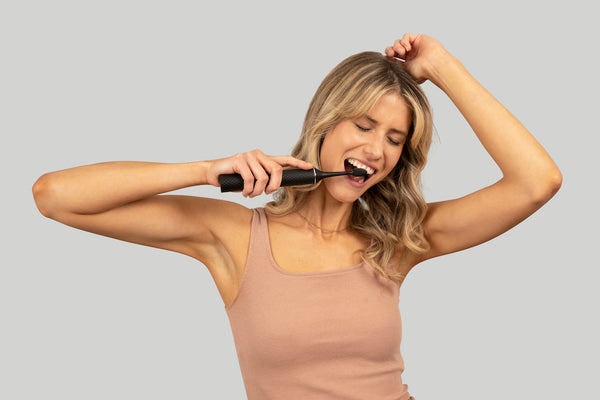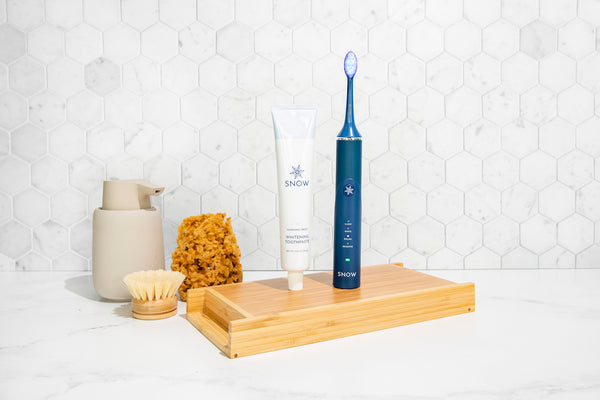Welcome to SNOW's comprehensive guide on electric toothbrushes and their impact on dental health.
Can electric toothbrushes damage teeth? The short answer is no; however, misconceptions persist about their safety and efficacy. We aim to clarify these doubts and provide evidence-based insights.
Electric toothbrushes have transformed dental hygiene, offering convenience and superior cleaning compared to manual brushes.
Our article will address common questions such as whether electric toothbrushes hurt teeth, how to safely use them, and their effectiveness compared to manual brushes. We'll explore potential risks, benefits, and best practices backed by scientific research.
SNOW is committed to empowering individuals with accurate information to make informed decisions about their oral care routine.
What this article covers:- Can an Electric Toothbrush Hurt Your Teeth?
- Can You Use an Electric Toothbrush Everyday?
- How to Safely Use an Electric Toothbrush
- Do Electric Toothbrushes Clean Better?
- What Does Over-Brushing Look Like?
- Is an Electric Toothbrush Better Than a Manual Toothbrush?
- Electric Toothbrush FAQs
Can An Electric Toothbrush Hurt Your Teeth?
Electric toothbrushes are generally safe when used correctly, as affirmed by experts from the Mayo Clinic. However, improper usage or aggressive brushing can cause potential harm.
According to dental professionals, excessive pressure and incorrect brushing techniques with electric toothbrushes may lead to gum recession and enamel wear.
To minimize the risk of dental damage, SNOW recommends selecting an electric toothbrush with soft bristles, like our LED Teeth Whitening Electric Toothbrush and Advanced Whitening Electric Toothbrush.
These toothbrushes are designed to provide effective cleaning without causing harm to the teeth and gums, enhancing your at-home teeth whitening experience.
Remember, brushing gently and allowing the brush's technology to do the work can help maintain optimal oral health and prevent potential damage.

Can You Use An Electric Toothbrush Everyday?
Yes, using an electric toothbrush daily is safe and effective when done correctly. SNOW emphasizes the importance of maintaining a consistent oral care routine to achieve and maintain white teeth.
According to WebMD, daily brushing with an electric toothbrush can efficiently remove plaque and debris, promoting healthier gums and teeth.
Consistency in oral hygiene practices, including daily brushing and flossing, plays a crucial role in preventing dental issues and preserving a bright smile.
Incorporating an electric toothbrush into your daily routine enhances cleaning effectiveness, ensuring thorough plaque removal and contributing to teeth whitening efforts.
Remember, in addition to regular brushing, scheduling routine dental check-ups is vital for identifying and addressing any potential oral health concerns early on.
How to Safely Use an Electric Toothbrush
To ensure safe and effective usage of an electric toothbrush, follow SNOW's expert recommendations.
According to the American Dental Association, proper technique is crucial for maximizing its benefits.
Hold the electric toothbrush at a 45-degree angle against your gums and teeth to target plaque and debris effectively.
Utilize gentle, circular motions to clean each tooth thoroughly, ensuring comprehensive coverage across the entire mouth.
Avoid applying excessive pressure or aggressive scrubbing, as this may result in gum irritation and enamel erosion over time.
By adhering to these guidelines, you can maintain optimal oral hygiene and contribute to your at-home teeth whitening routine effectively.
Do Electric Toothbrushes Clean Better?
SNOW confirms that electric toothbrushes offer superior cleaning compared to manual brushes.
The oscillating or rotating bristle technology enables them to reach inaccessible areas, ensuring a more thorough cleaning process.
This effectiveness contributes to reducing plaque buildup and improving overall oral hygiene.
Electric toothbrushes have been shown to outperform manual brushes in various studies, emphasizing their efficacy in plaque removal and gingival health improvement.
The ability to cover more surface area per stroke and maintain consistent brushing patterns makes electric toothbrushes a preferred choice for many individuals seeking effective at-home teeth whitening solutions.
What Does Over-Brushing Look Like?
Overbrushing, termed toothbrush abrasion, is recognizable through various symptoms. Receding gums, tooth sensitivity, and enamel wear are common indicators of overbrushing.
Additionally, bleeding gums and visible wear along the gumline signify excessive brushing pressure.
SNOW recommends adjusting brushing techniques upon experiencing these signs to prevent further damage to oral health.
Is An Electric Toothbrush Better Than a Manual Toothbrush?
Electric toothbrushes indeed provide benefits compared to manual brushes, such as improved plaque removal and better gum health.
These advantages stem from the oscillating or rotating movements of electric brush heads, which can reach areas that manual brushing might miss.
Additionally, electric toothbrushes often come with built-in timers, encouraging users to brush for the recommended duration.
However, whether an electric toothbrush is superior depends on individual preferences and habits. Some people may prefer the simplicity and familiarity of manual brushes.
Furthermore, proper brushing techniques, regardless of the type of toothbrush used, are crucial for maintaining oral hygiene and preventing dental issues.
Although electric toothbrushes offer advantages in plaque removal and gum health, the choice between electric and manual brushes should hinge upon personal preference and adherence to recommended brushing practices.

Electric Toothbrush FAQs
Can an electric brush damage your gums?
While electric brushes are generally safe, aggressive brushing or using a brush with hard bristles can damage gums and lead to recession. Opt for brushes with soft bristles and use gentle motions.
Will an electric toothbrush remove tartar?
Electric toothbrushes can help prevent tartar buildup by effectively removing plaque. However, once tartar forms, professional dental cleaning is necessary to remove it completely.
Conclusion
To wrap up, electric toothbrushes are pivotal for oral health maintenance when wielded properly.
Adhering to the recommended brushing methods ensures optimal results. At SNOW, we champion dental well-being, providing secure, potent teeth-whitening solutions for those desiring brighter, healthier teeth.
Discover our array of products tailored to elevate your dental regimen and attain the radiant, confident smile you desire.
For effective teeth whitening, explore SNOW's innovative toothbrushes and whitening products at SNOW.
If you found this article helpful, learn more from these related posts:
- Is an Electric Toothbrush Better
- When Should I Replace My Electric Toothbrush
- Should I Buy an Electric Toothbrush
- How Does a Vibrating Toothbrush Work
- Mold on Toothbrush
- Can You Use an Electric Toothbrush in the Shower
- What Are the Benefits of an Electric Toothbrush
- When Was the Toothbrush Invented?
- Types of Toothbrushes
- Types of Electric Toothbrush
- How Are Toothbrushes Made?
- Facts About Toothbrushes
- Evolution of Toothbrushes
- What Is the Best Toothbrush?
- Best Portable Electric Toothbrush

































































